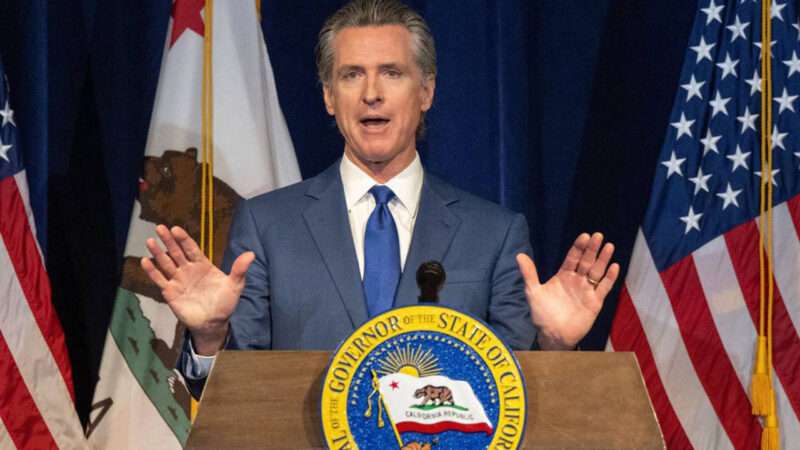
California Gov. Gavin Newsom concedes that there was room for improvement in his state's pandemic policies. On NBC's Meet the Press yesterday, Newsom largely declined to defend the substance of the restrictive policies he adopted, citing a lack of knowledge at the beginning of the pandemic about how COVID spread.
"We didn't know what we didn't know," he told host Chuck Todd, adding later that "we would have done everything differently."
The governor was nevertheless rather vague when saying what exactly he would have changed about California's pandemic policies, mentioning only the increased understanding of how COVID spreads indoors versus outdoors and the efficacy of different types of masks.
Newsom was also quick to describe his policies as part of a group effort and a consensus opinion, particularly at the outset of the outbreak.
"There was no 'I,' it was we collectively," he said. "Red states…shut down their beaches in the early part of the pandemic."
Newsom is right that in the earliest portion of the pandemic, California's stay-at-home order differed little from the policies of other states, red or blue. But his comments elide just how long his state's business closures and other restrictions lasted, and how responsible he specifically was for keeping them in place.
Throughout the pandemic, Newsom readily exercised his emergency powers as governor to erect a continually changing restrictions and reopening frameworks. Contra his comments that "there was no 'I,'" the governor acted unilaterally in adopting constantly changing public health restrictions.
He rebuffed legislative and legal efforts to limit his use of emergency powers. Where local governments declined to enforce many of the restrictions Newsom put into place, state agencies stepped in to threaten businesses with fines and license revocations.
Nor was Newsom just following the consensus opinion at a time of uncertainty. During the COVID spike of winter 2020–2021, the governor shut down outdoor dining and closed public parks, despite wide acknowledgement by that time that COVID was far less likely to spread outdoors.
Newsom's policies were so restrictive that they spawned mass non-compliance among business owners throughout California and criticism from some state public health officials.
Newsom's unwillingness to offer a full-throated defense of his COVID record shows he recognizes how unpopular a lot of his decisions were. His blame-shifting and revisionist history make clear he's less than fully contrite.
FREE MINDS
The Stanford epidemiologist Jay Bhattacharya has a piece in The Free Press about legal efforts to undo the federal government's censorship of online COVID information. On Friday, in the case of Missouri v Biden, a federal appeals court affirmed a lower court order telling the federal government to stop pressuring social media companies to take down posts or moderate content in a particular way.
Bhattacharya, a plaintiff in the lawsuit that produced that decision, writes:
The Biden administration, which has proven itself to be an enemy of free speech, will surely appeal the decision to the Supreme Court. But I am hopeful that we will win there, just as we have at every venue in this litigation. I am grateful for the resilience of the U.S. Constitution, which has withstood this challenge.
But I can never go back to the uncomplicated faith and naive confidence I had in America when I was young. Our government is not immune to the authoritarian impulse. I have learned the hard way that it is only we, the people, who must hold an overreaching government accountable for violating our most sacred rights. Without our vigilance, we will lose them.
FREE MARKETS
Is outdoor dining an unjustified land grab by restaurants and landlords? So argues an op-ed by Ivan Png in The Wall Street Journal. Png, a professor at the National University of Singapore, writes:
Prior to Covid, the restaurant didn't offer al fresco dining. Like many establishments, it won a windfall from the pandemic: a free extension onto the sidewalk and street.
The land grab—and that's what it is—benefits the owner of the property even more than the restaurant. Essentially, the extension onto the street is an expansion of the landlord's real estate, like an extra floor but much more accessible and visible.
Less obvious is who loses from the land grab. The city government loses parking revenue. Neighboring businesses lose accessibility and visibility, especially if restaurants extend beyond neighbors' store fronts. Pedestrians lose sidewalk space; what's left feels more like a tunnel. Drivers lose parking spaces and roadway.
Of course, things like free curbside parking are also effectively a "land grab." Drivers aren't paying a market rate for the space they're using to store their car.
Png suggests charging market rents to businesses for the public space they take up. A better option would be for cities to sell the space that's already been effectively privatized. The new owners could use it for outdoor dining, parking, or whatever activities suit them best.
QUICK HITS
- A devastating earthquake in Morocco has left some 2,500 people dead.
- Sen. Josh Hawley (R–Mo.) proposes an 18 percent cap on credit card interest rates.
- Service workers are tired of being involuntarily included in your dumb TikTok videos.
- A new poll finds that most California residents are opposed to reparations for black residents.
- We didn't need more evidence that rent control is a destructive and poorly target policy, but The New York Times has provided it anyway.
The post Gavin Newsom Spins Revisionist History of His COVID Record appeared first on Reason.com.







